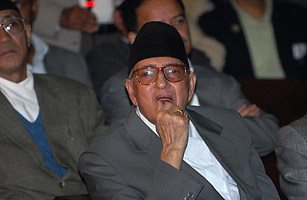
In a country riven by Monarchists and Maoists, Girija Prasad Koirala served as peacemaker. Nepal's four-time Prime Minister and champion of democracy died on March 20 at 86. His six decades in politics began amid striking laborers in jute mills, rose through civil war and regicide and ended with the future of his impoverished nation still poised on a knife edge.
Koirala, popularly known as GP Koirala, was at the forefront of mass protests in 1990 that eventually forced Nepal's King Birendra to introduce multiparty democracy into the Himalayan kingdom. Elections then catapulted Koirala and his Nepali Congress Party into power in 1991. But the subsequent years would be tumultuous ones, as a Maoist rebellion ravaged Nepal, leading to thousands of deaths. Power struggles and factional demagoguery came to define Kathmandu politics.
The murky 2001 massacre of Birendra and much of the royal family could have plunged the country into anarchy had it not been for Koirala's steady stewardship. He was instrumental in reaching out to the Maoists, bringing them into a peace process that abolished the monarchy in 2008 and transformed the country into a republic. But festering divisions remain, and there is no elder statesman of Koirala's stature to lead Nepal forward.
Koirala was born in exile in colonial India — his prominent dissident family at odds with the rulers in Kathmandu at the time — and grew up steeped in the secular traditions of South Asia's independence movements. Koirala's bearing, to the end of his days, was not unlike that of India's own apostle of democracy and first Prime Minister, Jawaharlal Nehru: austere and gaunt, forever garbed in an elegant blazer and his trademark Nepali cap.
—Ishaan Tharoor
This text originally appeared in the April 5, 2010 issue of TIME Magazine.